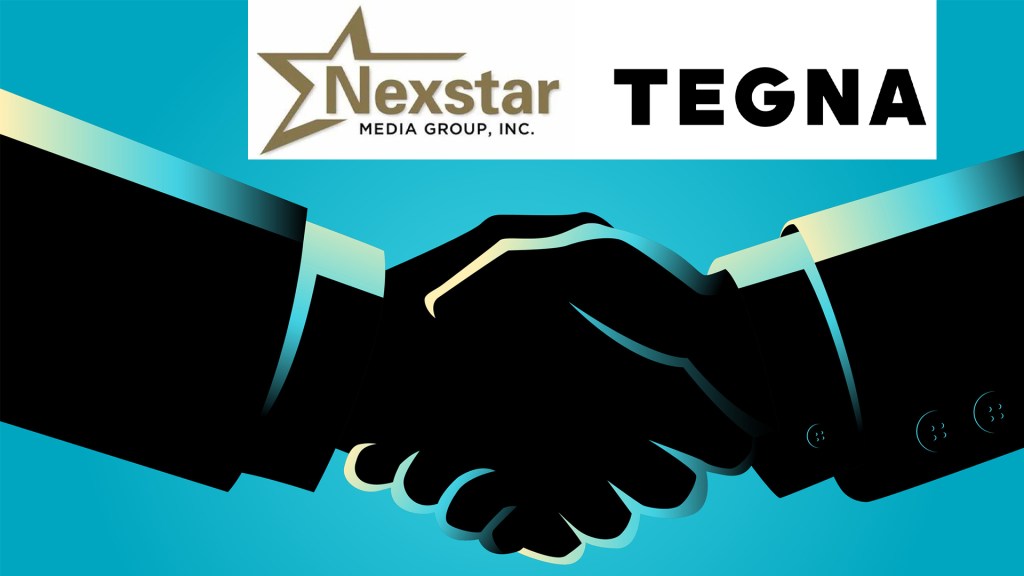Nexstar, the No. 1 owner of TV stations in the U.S., is acquiring rival Tegna in a deal that reshapes the industry and challenges decade-old limits on control of local media.
For $6.2 billion, including debt, Nexstar is continuing its run of acquisitions that has taken it from a fledgling radio station owner two decades ago to a dominant player. The transaction follows previous milestones like Nexstar acquiring 75% of the CW and taking over Tribune Media.
After the merger, which had been reported as being imminent earlier this month, the resulting company will have 265 stations in 44 states and the District of Columbia, representing 80% of U.S. TV households. That footprint far exceeds the longtime 39% limit on ownership of stations, which had been kept in place by both Republican and Democratic administrations over the past three decades.
Nexstar CEO Perry Sook has been one of the most vocal opponents of the 39% cap, calling it outdated in an era of Big Tech and diversified distribution and calling on the Trump Administration and the FCC to do away with the limit. The FCC this summer has been taking public comment on whether to raise or do away with the cap, a signal that its chairman, Brendan Carr, appointed by Donald Trump, is preparing to bring such a change before the commission.
In an interview with CNBC’s Squawk Box, Sook estimated that regulatory approval would be a process that could take up to 12 months. He has pitched the transaction as a way to put Nexstar “on a level playing field with big tech.” He said that, in seeking the combination, Nexstar was showing that it was “playing offense and defense to maintain a vital industry for America and a vital resource for information.”
An FCC spokesperson said, “We look forward to reviewing the application when it is filed and assessing the public interest equities.”
Nexstar’s overture followed closely on the heels of a proposal by Sinclair to buy Tegna. Sinclair, the No. 2 station owner, had previously taken steps to separate its station business from the rest of its portfolio, which includes cable’s Tennis Channel. Immediate reaction from Wall Street noted that Sinclair and Tegna collectively may have too much debt for a combination to close. Nexstar, by contrast, has a strikingly tidy balance sheet.
Public interest groups and many Democrats have expressed concern about allowing a single owner to control so much media real estate in the U.S. Cable and satellite groups also are raising concerns of industry consolidation, as it could change the leverage in their negotiations with broadcasters over retransmission consent fees.
Grant Spellmeyer, president and CEO of America’s Communications Association, representing small and medium sized cable and broadband operations, said in a statement, “We know exactly what will happen because of a major broadcaster consolidation — more blackouts and increased monthly bills.”
Station groups have countered in part by insisting that as newspapers and radio continue their long-term decline, stations offer the most robust local news coverage of any medium.
In his CNBC interview, Sook noted that there are 35 markets where Nexstar and Tegna each have station operations, but he compared the combination to a situation where two newspapers were “operating off the same printing press.”
He also said that local news units would remain autonomous. “We are first and foremost a local service business,” Sook said, adding that “no one in the organization dictates any content.” He did note that the exception may be in public service programming like telethons.
The announcement of the deal did not include any specific outlook on the regulatory landscape. It said the deal would leave Nexstar “well-positioned to compete in today’s fragmented and rapidly evolving marketplace. The new company will be better able to serve communities by ensuring the long-term vitality of local news and programming from trusted local sources and preserving the diversity of local voice and opinion.”
Sook saluted Trump in a press release. “The initiatives being pursued by the Trump administration offer local broadcasters the opportunity to expand reach, level the playing field, and compete more effectively with the Big Tech and legacy Big Media companies that have unchecked reach and vast financial resources. We believe Tegna represents the best option for Nexstar to act on this opportunity.”
Tegna had a deal to be acquired by private equity firm Standard General, but the then-Democrat-run FCC torpedoed the transaction, citing its expected negative effects on workers.
Local consolidation and the likely wave of M&A that will follow the Nexstar-Tegna deal stand in sharp contrast to the punitive approach to the Paramount-Skydance merger. That $8 billion deal involving legacy media properties CBS and Paramount Pictures was held up for months as Carr investigated claims of “news distortion” by CBS. Trump also extracted a $16 million settlement after filing a lawsuit against CBS News deemed by most legal experts to be without merit.
The Nexstar-Tegna transaction also will have to be reviewed by the Justice Department, which will examine its impact on the competitive landscape. Even if the FCC relaxes media ownership rules, Nexstar-Tegna may still face the prospect of having to sell some stations.
Andrew Lipman, attorney at Morgan Lewis in Washington, D.C., wrote in an analysis on Tuesday that an FCC rule that restricts the ownership of more than two stations in a market “will still be in place.” “An acquisition by Nexstar or Sinclair would result in common ownership of three full power TV stations in several local markets,” Lipman wrote. “The parties will need a waiver of the limitation or divest stations to a third party.”
— Ted Johnson contributed to this report.

